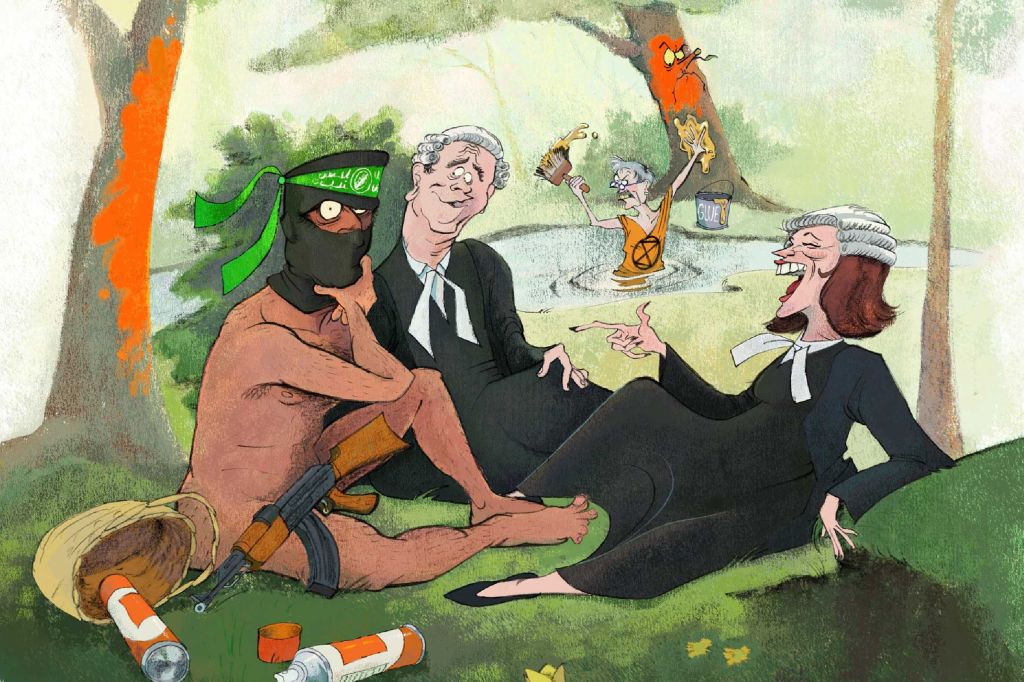
The Hunger Games is based on a 2008 novel about a despotic regime where brainwashed citizens are entertained with televised duels between teenagers. Not a bad idea. We go behind the scenes and watch Katniss (Mia Carragher) being selected to fight Peeta (Euan Garrett) who secretly adores her.
As soon as the plot starts, it seizes up. Instead of a gripping tragedy about two lovers forced to kill each other on TV, we’re given a masterclass in the show’s elaborate format. The duellists take part in interviews, coaching sessions, target practice, public parades and a popularity contest which permits them to attract ‘sponsors’ whose role is opaque. At the same time, we get a civics lesson. Katniss and Peeta are slaves in a post-fascist world with an amazingly complicated system of government. Do we need to know the socioeconomic history of District 12?
The creepy president (John Malkovich) pops up on screen occasionally to send good wishes to the gladiators and he looks predictably weird in a creaseless white blouse without any buttons. Fans of the film must know all the background details and yet they have to sit patiently for an hour while the information is revealed all over again. There’s no narrative movement. Katniss and Peeta are immobile bumpkins who see what’s happening around them but never make choices or display heroism or discover new facets of themselves. It’s like watching two eggs being turned into an omelette. Minor alterations occur but the ingredients don’t change their nature. Visually, the show is interesting enough. The athletic young actors caper around the stage pretending to injure each other with punches, kicks and arm locks. You might as well go and see a warm-up session at a jiu-jitsu club.
After the interval, a surprise. Katniss and Peeta will not fight alone. Six more pairs of pugilists will join the bloodthirsty free-for-all. And a new rule is introduced. The contestants may form alliances and hunt in packs. And so the slaughter begins. Several warriors are gored and dispatched immediately. The survivors sprint off into the forest and try to murder each other with daggers and arrows.
Small children may enjoy this show but anyone over 13 will be bored senseless
Katniss gets help from an unknown source – which is a terrible piece of storytelling. It makes her lifeless character even more passive and inert. She’s given a pair of magic glasses that enable her to kill an enemy with hidden explosives. Then she’s ordered to throw a nasty hornets’ nest at a rival who gets stung to death. The rules change again. The creepy president declares that Katniss must die but this order is misunderstood so he has to announce it again. (The plotting in this show is breathtakingly lazy.)
Meanwhile another part of the rulebook is being tinkered with by the TV producers. Not just once but several times. What a mess! The audience has no idea what’s going on because the format keeps changing. At the end of the yarn, the president’s attempt to bump Katniss off seems to have misfired. But how? He’s the leader of a one-party state and he can’t control his own TV channel. It’s nonsense.
Katniss ends the story as she began, a pale cheerless urchin with nice hair and a decent complexion. Small children may enjoy this show but anyone over 13 will be bored senseless.
The Papatango New Writing Prize of 2024 was awarded to a play with an irritating name. The Meat Kings! (Inc.) of Brooklyn Heights is set in a butcher’s shop run by the saintly Paula who offers jobs to unemployables. David, for example, is a convicted Wall Street fraudster.
A young girl called T is hired after she leaves prison for committing an unknown offence. T is attracted to a Mexican, J.D., whose work permit needs to be renewed at a cost of $200. It would make sense if J.D. were to ask the saintly Paula for a loan but he doesn’t. Then he does. And Paula says yes. OK. Problem solved.
Their colleague Billy, who is also a jailbird, needs money for his mother’s cancer treatment but he doesn’t ask the saintly Paula for a loan. Instead he steals hot dogs and sells them on the black market. It’s not clear how many sausages he must filch before he can cover his mother’s medical bills. Quite a few, one imagines.
The play is expensively produced and it looks great but the plot concerns dull problems being solved by bland, forgettable people. The characters soliloquise too much about their personal woes and the script feels like an assignment from a playwrighting course.
In Act Two, the plot suddenly snarls into life as a gang of thugs burst in and kidnap one of the characters. Accusations of betrayal are hurled around and everyone starts screaming at each other. Suddenly the play becomes noisy and frenetic. But that’s not drama. It’s chaos.









Comments